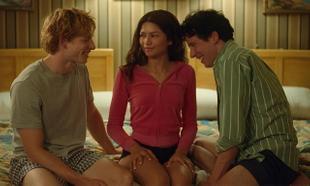Attempting to shoot a film in one take is, let’s be frank, showing off. It can be nothing more than an exhibition of a director’s technical ability that can make the viewer forever aware they’re watching a film and snap them out of the narrative (less so for Russian Ark than Silent House).
But with Victoria, Sebastian Schipper ensures that the one shot-real time approach draws the audience into, first, the intimate romantic first half and then, later, heightens the tension of the unexpected genre switch of the second.
Thumping techno music. A dancefloor of an underground Berlin club. Bodies loom out of the fog. We focus on Victoria (Costa), a Spanish waitress, who loses herself to the music. Having her fill, she leaves the floor and makes her way out into the night. She meets Sonne (Lau), Boxer (Rogowski), Blinker (Yigit) and Fuss (Max Mauff), four drunks attempting to break into a car. Sonne comes on with the flirt and Victoria responds, agreeing to accompany the guys to a party.
As they wander through the Berlin streets Victoria and Sonne get close and, when they are alone, a real bond is formed when she treats him to a taste of her talents on the piano. But then Boxer breaks up the intimate moment and announces that he has to do a job for a gangster who protected him in jail and he needs Sonne’s help. Unwilling to let the romance dwindle before it has a chance to develop, Victoria agrees to come along…
All one take. From the dancefloor to the street, to the off license, to the shared joints atop a building, to the café Victoria works in, Schipper’s camera bobs and weaves. The natural dialogue, which is allowed to tangent, makes Before Sunset feel forced and fake, and the low-key love story beats with realism, helped along by Schipper’s tactic of drowning out the street and allowing Nils Frahm’s soundtrack free rein.
The switch in genre, in particular the moment when Victoria stops being a Linklater film and becomes something a lot darker, can stretch credibility somewhat but to the director’s credit he does try to pave over the glaring crack. To justify Victoria’s decision to go along with these dangerous strangers he subtly plants her isolation and loneliness in the opening scenes – she dances alone and is a little too desperate to engage the busy bartender in conversation. And that these ‘nice hooligans’ would be easily involved in such an undertaking is given credence because we first meet them attempting to break into a car. The shift in tone isn’t easy to buy into, but if one makes it over that hurdle it’s easy the unpredictable second half is a thrilling adventure.
Victoria is a feat in filmmaking and the performances, moving from the cosy, loved-up vibe to jittery, coke-addled adrenalin are a joy.










































































